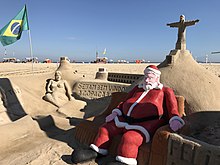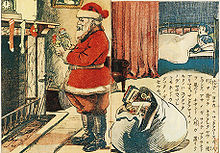「クリスマス」の版間の差分
m →概要: リンクを追加 タグ: 差し戻し済み モバイル編集 モバイルアプリ編集 Androidアプリ編集 |
タグ: 取り消し |
||
| 15行目: | 15行目: | ||
イエスが誕生した月日は不明であるが、4世紀初頭の教会では12月25日と定めていた<ref>Corinna Laughlin, Michael R. Prendergast, Robert C. Rabe, Corinna Laughlin, Jill Maria Murdy, Therese Brown, Mary Patricia Storms, Ann E. Degenhard, Jill Maria Murdy, Ann E. Degenhard, Therese Brown, Robert C. Rabe, Mary Patricia Storms, Michael R. Prendergast, [https://books.google.com/books/about/Sourcebook_for_Sundays_Seasons_and_Weekd.html?id=kQWbWCXMGQgC ''Sourcebook for Sundays, Seasons, and Weekdays 2011: The Almanac for Pastoral Liturgy''] {{Webarchive|url=https://web.archive.org/web/20150407000845/http://books.google.com/books/about/Sourcebook_for_Sundays_Seasons_and_Weekd.html?id=kQWbWCXMGQgC|date=April 7, 2015}}, LiturgyTrainingPublications, 2010, p. 29.</ref><ref>[https://www.tertullian.org/fathers/chronography_of_354_12_depositions_martyrs.htm "The Chronography of 354 AD. ]</ref><ref name="SusanKOrigins">{{Cite book|url=https://books.google.com/books?id=6MXPEMbpjoAC&pg=PA133|title=Toward the Origins of Christmas|last=Roll|first=Susan K.|publisher=Peeters Publishers|year=1995|page=133|isbn=9789039005316}}</ref>。これはローマ暦の[[冬至]]に相当する<ref name="Bradt">Bradt, Hale, ''Astronomy Methods'', (2004), p. 69.</ref>。春分の日でもある3月25日の[[受胎告知]]からちょうど9ヶ月後である。多くのキリスト教徒は、世界各国でおおよそ採用されている、[[グレゴリオ暦]]の12月25日に祝う。しかし、[[東方教会|東方キリスト教会]]の一部では、クリスマスを旧[[ユリウス暦]]の12月25日に祝い、これは現在グレゴリオ暦の1月7日に相当する。キリスト教では、イエスの正確な誕生日を知ることよりも、神が人類の[[宗教における罪|罪]]を償うために[[受肉|人の姿でこの世に現れたこと]]を信じることが、クリスマスを祝う最大の目的であると考えられている<ref name="Joan Chittister, Phyllis Tickle">{{Cite book|url=https://books.google.com/books?id=inhMGc5732kC&q=date+of+christmas+important&pg=PT40|title=The Liturgical Year|publisher=[[Thomas Nelson (publisher)|Thomas Nelson]]|quote=Christmas is not really about the celebration of a birth date at all. It is about the celebration of a birth. The fact of the date and the fact of the birth are two different things. The calendrical verification of the feast itself is not really that important ... What is important to the understanding of a life-changing moment is that it happened, not necessarily where or when it happened. The message is clear: Christmas is not about marking the actual birth date of Jesus. It is about the Incarnation of the One who became like us in all things but sin ([[Hebrews 4:15]]) and who humbled Himself "to the point of death-even death on a cross" (Phil. 2:8). Christmas is a pinnacle feast, yes, but it is not the beginning of the liturgical year. It is a memorial, a remembrance, of the birth of Jesus, not really a celebration of the day itself. We remember that because the Jesus of history was born, the Resurrection of the Christ of faith could happen.|accessdate=April 2, 2009|isbn=978-1-4185-8073-5|date=November 3, 2009}}</ref><ref name="Voice-Christmas">{{Cite web|url=http://www.crivoice.org/cyxmas.html|title=The Christmas Season|publisher=CRI / Voice, Institute|accessdate=April 2, 2009|quote=The origins of the celebrations of Christmas and Epiphany, as well as the dates on which they are observed, are rooted deeply in the history of the early church. There has been much scholarly debate concerning the exact time of the year when Jesus was born, and even in what year he was born. Actually, we do not know either. The best estimate is that Jesus was probably born in the springtime, somewhere between the years of 6 and 4 BC, as December is in the middle of the cold rainy season in [[Bethlehem]], when the sheep are kept inside and not on pasture as told in the Bible. The lack of a consistent system of timekeeping in the first century, mistakes in later calendars and calculations, and lack of historical details to cross-reference events have led to this imprecision in fixing Jesus' birth. This suggests that the Christmas celebration is not an observance of a historical date, but a commemoration of the event in terms of worship.|archiveurl=https://web.archive.org/web/20090407051524/http://www.crivoice.org/cyxmas.html|archivedate=April 7, 2009}}</ref><ref name="Harvard University">{{Cite book|url=https://books.google.com/books?id=x_kBAAAAYAAJ&q=date+of+christmas+unimportant&pg=PA469|title=The School Journal, Volume 49|publisher=[[Harvard University]]|quote=Throughout the Christian world the 25th of December is celebrated as the birthday of Jesus Christ. There was a time when the churches were not united regarding the date of the joyous event. Many Christians kept their Christmas in April, others in May, and still others at the close of September, till finally December 25 was agreed upon as the most appropriate date. The choice of that day was, of course, wholly arbitrary, for neither the exact date not the period of the year at which the birth of Christ occurred is known. For purposes of commemoration, however, it is unimportant whether the celebration shall fall or not at the precise anniversary of the joyous event.|accessdate=April 2, 2009|year=1894}}</ref>。 |
イエスが誕生した月日は不明であるが、4世紀初頭の教会では12月25日と定めていた<ref>Corinna Laughlin, Michael R. Prendergast, Robert C. Rabe, Corinna Laughlin, Jill Maria Murdy, Therese Brown, Mary Patricia Storms, Ann E. Degenhard, Jill Maria Murdy, Ann E. Degenhard, Therese Brown, Robert C. Rabe, Mary Patricia Storms, Michael R. Prendergast, [https://books.google.com/books/about/Sourcebook_for_Sundays_Seasons_and_Weekd.html?id=kQWbWCXMGQgC ''Sourcebook for Sundays, Seasons, and Weekdays 2011: The Almanac for Pastoral Liturgy''] {{Webarchive|url=https://web.archive.org/web/20150407000845/http://books.google.com/books/about/Sourcebook_for_Sundays_Seasons_and_Weekd.html?id=kQWbWCXMGQgC|date=April 7, 2015}}, LiturgyTrainingPublications, 2010, p. 29.</ref><ref>[https://www.tertullian.org/fathers/chronography_of_354_12_depositions_martyrs.htm "The Chronography of 354 AD. ]</ref><ref name="SusanKOrigins">{{Cite book|url=https://books.google.com/books?id=6MXPEMbpjoAC&pg=PA133|title=Toward the Origins of Christmas|last=Roll|first=Susan K.|publisher=Peeters Publishers|year=1995|page=133|isbn=9789039005316}}</ref>。これはローマ暦の[[冬至]]に相当する<ref name="Bradt">Bradt, Hale, ''Astronomy Methods'', (2004), p. 69.</ref>。春分の日でもある3月25日の[[受胎告知]]からちょうど9ヶ月後である。多くのキリスト教徒は、世界各国でおおよそ採用されている、[[グレゴリオ暦]]の12月25日に祝う。しかし、[[東方教会|東方キリスト教会]]の一部では、クリスマスを旧[[ユリウス暦]]の12月25日に祝い、これは現在グレゴリオ暦の1月7日に相当する。キリスト教では、イエスの正確な誕生日を知ることよりも、神が人類の[[宗教における罪|罪]]を償うために[[受肉|人の姿でこの世に現れたこと]]を信じることが、クリスマスを祝う最大の目的であると考えられている<ref name="Joan Chittister, Phyllis Tickle">{{Cite book|url=https://books.google.com/books?id=inhMGc5732kC&q=date+of+christmas+important&pg=PT40|title=The Liturgical Year|publisher=[[Thomas Nelson (publisher)|Thomas Nelson]]|quote=Christmas is not really about the celebration of a birth date at all. It is about the celebration of a birth. The fact of the date and the fact of the birth are two different things. The calendrical verification of the feast itself is not really that important ... What is important to the understanding of a life-changing moment is that it happened, not necessarily where or when it happened. The message is clear: Christmas is not about marking the actual birth date of Jesus. It is about the Incarnation of the One who became like us in all things but sin ([[Hebrews 4:15]]) and who humbled Himself "to the point of death-even death on a cross" (Phil. 2:8). Christmas is a pinnacle feast, yes, but it is not the beginning of the liturgical year. It is a memorial, a remembrance, of the birth of Jesus, not really a celebration of the day itself. We remember that because the Jesus of history was born, the Resurrection of the Christ of faith could happen.|accessdate=April 2, 2009|isbn=978-1-4185-8073-5|date=November 3, 2009}}</ref><ref name="Voice-Christmas">{{Cite web|url=http://www.crivoice.org/cyxmas.html|title=The Christmas Season|publisher=CRI / Voice, Institute|accessdate=April 2, 2009|quote=The origins of the celebrations of Christmas and Epiphany, as well as the dates on which they are observed, are rooted deeply in the history of the early church. There has been much scholarly debate concerning the exact time of the year when Jesus was born, and even in what year he was born. Actually, we do not know either. The best estimate is that Jesus was probably born in the springtime, somewhere between the years of 6 and 4 BC, as December is in the middle of the cold rainy season in [[Bethlehem]], when the sheep are kept inside and not on pasture as told in the Bible. The lack of a consistent system of timekeeping in the first century, mistakes in later calendars and calculations, and lack of historical details to cross-reference events have led to this imprecision in fixing Jesus' birth. This suggests that the Christmas celebration is not an observance of a historical date, but a commemoration of the event in terms of worship.|archiveurl=https://web.archive.org/web/20090407051524/http://www.crivoice.org/cyxmas.html|archivedate=April 7, 2009}}</ref><ref name="Harvard University">{{Cite book|url=https://books.google.com/books?id=x_kBAAAAYAAJ&q=date+of+christmas+unimportant&pg=PA469|title=The School Journal, Volume 49|publisher=[[Harvard University]]|quote=Throughout the Christian world the 25th of December is celebrated as the birthday of Jesus Christ. There was a time when the churches were not united regarding the date of the joyous event. Many Christians kept their Christmas in April, others in May, and still others at the close of September, till finally December 25 was agreed upon as the most appropriate date. The choice of that day was, of course, wholly arbitrary, for neither the exact date not the period of the year at which the birth of Christ occurred is known. For purposes of commemoration, however, it is unimportant whether the celebration shall fall or not at the precise anniversary of the joyous event.|accessdate=April 2, 2009|year=1894}}</ref>。 |
||
各国でクリスマスに関連する祝いの習慣には、キリスト教以前、キリスト教、[[世俗]]的なテーマや起源が混在している<ref>{{Cite book|title=West's Federal Supplement|publisher=[[West Publishing Company]]|year=1990|quote=While the Washington and King birthdays are exclusively secular holidays, Christmas has both secular and religious aspects.}}</ref>。現代の一般的な習慣としては、プレゼントを贈る、[[アドベントカレンダー]]や[[アドベントリース]]を完成させる、クリスマス音楽や[[クリスマス・キャロル|キャロル]]を演奏する、キリスト降誕劇を見る、[[クリスマス・カード|クリスマスカード]]を交換する、教会の礼拝、特別食、[[クリスマスツリー]]、クリスマスライト、キリスト[[キリストの降誕#降誕場面|降誕]]シーン、ガーランド、[[リース (装飾)|リース]]、ヤドリギ、ヒイラギなど様々なクリスマスの飾り付けをする、などが挙げら |
各国でクリスマスに関連する祝いの習慣には、キリスト教以前、キリスト教、[[世俗]]的なテーマや起源が混在している<ref>{{Cite book|title=West's Federal Supplement|publisher=[[West Publishing Company]]|year=1990|quote=While the Washington and King birthdays are exclusively secular holidays, Christmas has both secular and religious aspects.}}</ref>。現代の一般的な習慣としては、プレゼントを贈る、[[アドベントカレンダー]]や[[アドベントリース]]を完成させる、クリスマス音楽や[[クリスマス・キャロル|キャロル]]を演奏する、キリスト降誕劇を見る、[[クリスマス・カード|クリスマスカード]]を交換する、教会の礼拝、特別食、[[クリスマスツリー]]、クリスマスライト、キリスト[[キリストの降誕#降誕場面|降誕]]シーン、ガーランド、[[リース (装飾)|リース]]、ヤドリギ、ヒイラギなど様々なクリスマスの飾り付けをする、などが挙げられる。さらに、[[サンタクロース]]、ファーザー・クリスマス、[[ミラのニコラオス|聖ニコラス]]、[[クリストキント]]など、クリスマスシーズンに子供たちに贈り物をする人物と密接に関連し、しばしば交換される人物がおり、それぞれ独自の伝統と言い伝えを持っている<ref>{{Cite news|url=https://www.nbcnews.com/id/wbna16329025|title=Poll: In a changing nation, Santa endures|date=December 22, 2006|accessdate=December 24, 2018|agency=Associated Press|archiveurl=https://web.archive.org/web/20181226063645/http://www.nbcnews.com/id/16329025/ns/us_news-life/t/poll-changing-nation-santa-endures/|archivedate=December 26, 2018}}</ref>。プレゼントを贈るという行為や、その他多くのクリスマス行事は、経済活動の活発化を伴うため、小売業者や企業にとって重要なイベントであり、重要な販売期間となっている。過去数世紀にわたり、クリスマスは世界の多くの地域で経済効果を着実に高めてきた。 |
||
== 位置付け == |
== 位置付け == |
||
2024年4月18日 (木) 07:20時点における版

概要
﹁恐れるな。見よ、すべての民に与えられる大きな喜びを、あなたがたに伝える。 きょうダビデの町に、あなたがたのために救い主がお生まれになった。このかたこそ主なるキリストである。 あなたがたは、幼な子が布にくるまって飼葉おけの中に寝かしてあるのを見るであろう。それが、あなたがたに与えられるしるしである﹂ — ルカによる福音書第2章第8~14節 イエス・キリストの誕生を記念する年中行事で、主に12月25日に、世界中の何十億人もの人々の間で宗教的・文化的に祝われるものである[5][6]。キリスト教の典礼年の中心的な祝祭であり、アドベント︵降誕祭︶の季節に先立ち、西洋では歴史的に12日間続き、十二夜に最高潮に達するクリスマスの時期︵Christmastide︶を開始する。クリスマスは多くの国で祝日となっており[7][8][9]、大多数のキリスト教徒が宗教的に[10]、また多くの非キリスト教徒が文化的に祝う[11]。クリスマスを中心に構成されるホリデーシーズンの重要な部分を形成する。 新約聖書に記された伝統的なクリスマスの物語﹁イエスの降誕﹂は、イエスがメシアの予言に従ってベツレヘムで生まれたとするものである[12]。ヨセフとマリアがこの街に到着したとき、宿屋に部屋がなかったため、馬小屋を提供され、そこですぐにキリストが生まれ、天使がこのニュースを羊飼いに告げ、羊飼いがそのニュースを広めたという[13]。一方ヘロデ大王は、自分の地位をいずれ脅かすであろう者が現れた事を知り、恐れをなしてどの子がイエスなのか特定しようとしたが、出来なかったため、同世代の幼児を皆殺しにした︵幼児虐殺の逸話︶。 イエスが誕生した月日は不明であるが、4世紀初頭の教会では12月25日と定めていた[14][15][16]。これはローマ暦の冬至に相当する[17]。春分の日でもある3月25日の受胎告知からちょうど9ヶ月後である。多くのキリスト教徒は、世界各国でおおよそ採用されている、グレゴリオ暦の12月25日に祝う。しかし、東方キリスト教会の一部では、クリスマスを旧ユリウス暦の12月25日に祝い、これは現在グレゴリオ暦の1月7日に相当する。キリスト教では、イエスの正確な誕生日を知ることよりも、神が人類の罪を償うために人の姿でこの世に現れたことを信じることが、クリスマスを祝う最大の目的であると考えられている[18][19][20]。 各国でクリスマスに関連する祝いの習慣には、キリスト教以前、キリスト教、世俗的なテーマや起源が混在している[21]。現代の一般的な習慣としては、プレゼントを贈る、アドベントカレンダーやアドベントリースを完成させる、クリスマス音楽やキャロルを演奏する、キリスト降誕劇を見る、クリスマスカードを交換する、教会の礼拝、特別食、クリスマスツリー、クリスマスライト、キリスト降誕シーン、ガーランド、リース、ヤドリギ、ヒイラギなど様々なクリスマスの飾り付けをする、などが挙げられる。さらに、サンタクロース、ファーザー・クリスマス、聖ニコラス、クリストキントなど、クリスマスシーズンに子供たちに贈り物をする人物と密接に関連し、しばしば交換される人物がおり、それぞれ独自の伝統と言い伝えを持っている[22]。プレゼントを贈るという行為や、その他多くのクリスマス行事は、経済活動の活発化を伴うため、小売業者や企業にとって重要なイベントであり、重要な販売期間となっている。過去数世紀にわたり、クリスマスは世界の多くの地域で経済効果を着実に高めてきた。位置付け
新約聖書にはキリストの降誕については、﹃ルカによる福音書﹄第2章10節および﹃マタイによる福音書﹄第1章18節 - 第2章18節に記述があるものの、いずれも誕生日を特定する記述は無い。 クリスマスが行なわれる日は、あくまでも﹁降誕を記念する祭日﹂と位置付けられているのであって、前述したように聖書にはイエスの誕生日を記述する内容が存在しないことから﹁イエス・キリストの誕生日﹂とされているわけではない[23]。イエス・キリストが降誕した日がいつにあたるのかについては、古代からキリスト教内でも様々な説がある︵例えば3世紀の初め頃には、アレクサンドリアのクレメンスは5月20日と推測していた︶[4]。 また、キリスト教で最も重要な祭と位置づけられるのはこの祭ではなく、復活祭︵イースター/パスハ︶とされている[24][25][26][27]。起源
日付の候補と決定
325年5月の第1ニカイア公会議において、キリストの降誕を祝う日について議論された。日付の候補は、おもなものだけでも、1月6日、2月2日、3月25日、3月28日、4月2日、4月19日、4月29日、5月20日、11月8日、11月17日、11月18日、12月25日があった[28][29]。 このうち、古代共和政ローマ時代の﹁ローマ暦﹂において冬至の日とされていた12月25日が、﹁降誕を祝う日﹂として次第に定着していった[注 2]。12月25日に降誕祭を行う風習は、遅くとも354年[30]には西方教会で始まり、4世紀末には東方教会の多くにも広まった[31]。 古代ローマの宗教のひとつミトラ教では、12月25日は﹁不滅の太陽が生まれる日﹂とされ、太陽神ミトラスを祝う冬至の祭であり、これから派生してローマ神話の太陽神ソル・インウィクトゥスの祭ともされていた。これが降誕祭の日付決定に影響したのではないかとも推察されている[注 3]。古式を守るアルメニアの降誕祭
教会暦における日付・期間

日付
西方教会
東方教会
東方教会のうちユリウス暦を教会暦として使用する教会では、グレゴリオ暦の1月7日に祝われる。これはユリウス暦の12月25日が、21世紀現在、グレゴリオ暦の1月7日に当たるからである[注 4][34][35]︵後述︶。また例外的に、アルメニア使徒教会では教会暦上の1月6日に祝われる︵前述︶。日付の区切り
キリスト教に先立つユダヤ教の暦、古代ローマの暦、およびこれらを引き継いだ教会暦では、現代の常用時とは異なり、日没を日界︵一日の境目︶としている[36]。このため、教会暦ではクリスマス︵降誕日︶は﹁12月24日︵常用時︶の日没から12月25日︵常用時︶の日没まで﹂である。また24日︵常用時︶の日没から24日︵常用時︶の24時すなわち25日︵常用時︶の0時︵正子︶までが﹁クリスマス・イヴ﹂である︵クリスマス・イヴ#日付︶。12月25日︵常用時︶の日没以降は、12月26日︵教会暦︶である。 伝統的には、クリスマス・イヴの夕刻~晩には﹁晩課﹂︵﹁晩祷﹂、﹁夕の礼拝﹂などとも︶を行って降誕の喜びの先取りとし、羊飼いが天使から降誕のみ告げを受けたとされる夜中[37]︵古来は12月25日の0時前後︶には﹁深夜ミサ﹂あるいは﹁徹夜祷﹂などと呼ばれるミサ/聖餐式︵西方教会︶・奉神礼︵東方教会︶を行う。そして、25日の午前には改めて降誕を祝うミサ/聖餐式/聖体礼儀を行う。期間
西方教会

東方教会
東方教会のうち、ギリシャ正教とも呼ばれる東方正教会では、エルサレム総主教庁、ロシア正教会、セルビア正教会、ウクライナ正教会、グルジア正教会など、そして東方諸教会・非カルケドン派正教会に分類されるコプト正教会[45]などは、ユリウス暦︵正教では﹁旧暦﹂と呼ばれる︶の12月25日︵21世紀現在、グレゴリオ暦1月7日にあたる︶に降誕祭を祝うが、いわゆるギリシャ正教のうち、コンスタンティノープル総主教庁、ギリシャ正教会、ブルガリア正教会、ルーマニア正教会などでは、修正ユリウス暦︵正教では﹁新暦﹂と呼ばれる︶の12月25日︵21世紀現在、グレゴリオ暦の同日にあたる︶に執り行う[46]。非カルケドン派正教会に分類されるアルメニア使徒教会では、教会暦上の1月6日に行う︵前述︶。 正教会では、降誕祭と、﹁主の洗礼﹂を記念する﹁神現祭﹂︵降誕祭の12日後、ユ暦1月6日/グ暦1月19日に行われる︶とは奉神礼として一連のものであり、構造は同じである。降誕祭の祭前期には﹁聖列祖の主日﹂で原祖アダム以来のキリストの肉に縁る先祖を[47]、﹁聖世祖の主日﹂では神の祖父母イオアキムとアンナら歴代の義者を記念する[48]。そして降誕祭の期間中の1月1日︵ユリウス暦の1月1日は、21世紀現在、グレゴリオ暦1月14日にあたる︶には、﹁主の割礼祭﹂を祝う。 誤解されがちなこととして、﹁東方教会ではエピファニーの日[注 10]に降誕を祝う﹂と言われることがある。年月を経るごとにユリウス暦は、本来の太陽年とそれに近いグレゴリオ暦からずれが生じて、20世紀~21世紀の今[注 4]たまたまユリウス暦12月25日がグレゴリオ暦1月7日︵グ暦1月6日はユ暦12月24日‥クリスマス・イヴ︶になっているだけであり、ユリウス暦とグレゴリオ暦の違いはあれど、あくまで12月25日が降誕日なのである。ただし、1つ例外としては、アルメニア使徒教会では1月6日に降誕祭と神現祭を同時に祝う風習がある︵前述︶。名称
教会における名称
東方正教会︵ギリシャ正教︶では、正式なフルネームとしては﹁主神︵しゅ-かみ︶我が救世主イイスス・ハリストスの降誕祭﹂[50][注 11]︵英語: “The Nativity of our Lord God and Savior Jesus Christ”[51]、ロシア語: “Рождество Господа Бога и Спаса нашего Иисуса Христа”[52]︶などと呼ばれる。 西方教会︵おもにローマ・カトリック教会︶では、ラテン語: “Festum Nativitatis Domini nostri Jesu Christi”[53][注 12]︵私たちの主︵しゅ︶イエス・キリストの降誕祭︶、それを短縮した羅: “Festum Nativitatis Domini”[54]︵主の降誕祭︶、あるいは特に﹁降誕日﹂を指して、羅: “Dies Natalis Jesu Christi”[55][注 13]︵イエス・キリストの降誕日︶などと呼ばれる。各国語と語源
日本語での当祭の呼び方には、英語の"Christmas"に由来する﹁クリスマス﹂の他に、﹁降誕祭﹂、﹁降誕日﹂、﹁聖誕祭﹂、﹁聖夜﹂などがある。 英語の"Christmas"は、﹁キリスト︵Christ‥クライスト︶のミサ︵Mass‥マス︶﹂に由来する。これは、古英語の"Crīstes mæsse"︵初出 1038年︶が、中英語において"Cristemasse"となり、現在につながる[56][57]。 ヨーロッパ各国語では、﹁キリストの誕生﹂あるいは、"キリストの" にあたる部分を省略した﹁誕生﹂を指す言葉︵転訛含む︶で当祭を指す例がよく見られる。以下の表において﹁誕生﹂は、日本語におけるキリスト教用語の﹁降誕﹂と書き表す。| 言語 | 表記 | 由来 | 発音 | ||
|---|---|---|---|---|---|
| 国際音声記号 | 音声ファイル | 片仮名音写[* 1] | |||
| ギリシア語 | Χριστούγεννα | キリストの降誕 | [xɾiˈstuʝena][* 2] | フリストゥーイェナ | |
| ラテン語 | Christi Natalis | [ˈkristi naˈtaːlis][* 3] | クリスティ・ナターリス | ||
| アルメニア語 | Սուրբ Ծնունդ | 聖なる降誕 | [suɾpʰ t͡səˈnund][* 4] | スルプ・ツァヌンド | |
| イタリア語 | Natale | 降誕 | [naˈtaːle] | ナターレ | |
| フランス語 | Noël | [nɔɛl] | ノエル | ||
| スペイン語 | Navidad | [naβiˈða(ð)] | ナビダー | ||
| ([naβiˈðaθ][* 5]) | (ナビダース[* 5]) | ||||
| イベリアポルトガル語 | Natal | [nɐˈtaɫ] | ナタ(ー)ル | ||
| ブラジルポルトガル語 | [naˈtaw] | ナタ(ー)ウ | |||
| ロシア語 | Рождество | [rəʐdʲɪstˈvo] | ラジュディストヴォー | ||
| グルジア語 | შობა | [ʃɔba] | ショバ | ||
| ポーランド語 | Boże Narodzenie | 神の降誕 | [ˈbɔʐɛ ˌn̪arɔˈd͡zɛ̃ɲɛ] | ボージェ・ナロゼーニャ | |
| 英語 | Christmas | キリストのミサ | [ˈkrɪsməs] | クリスマス | |
| オランダ語 | Kerstmis | [ˈkɛrs(t)məs] | ケルストゥミス | ||
| ドイツ語 | Weihnachten | 聖夜[* 6] | [ˈvaɪˌnaxtən] | ヴァイナハテン | |
| デンマーク語 | Jul | 冬至祭 (ユール) |
[juːl] | ユール | |
| ノルウェー語 | Jul | [jʉːl] | ユール | ||
| スウェーデン語 | Jul | [jʉːl] | ユール | ||
| フィンランド語 | Joulu | [jou̯lu] | ヨウル | ||
略記
各国において
欧米諸国全般
南半球全般

この節の加筆が望まれています。 |
イギリス
この節の加筆が望まれています。 |
ドイツ語圏・ベネルクス

ナチス・ドイツ時代

イタリア
イタリアのほとんどの地域では、プレゼントを持って来るのは魔女のベファーナとされる。この節の加筆が望まれています。 |
北欧
スカンディナヴィア諸国を中心とする北欧のクリスマスは「ユール」と呼ばれ、12月13日の聖ルチア祭から始まる。古代ゲルマン人の冬至祭の影響を色濃く残しており、ユール・ゴート(ユールブック)と呼ばれる、ワラで作ったヤギを飾ること、妖精がプレゼントを持って来てくれることなど、独自の習慣が見られる。また、クリスマスの時期は真冬であるため、小鳥たちがついばめるように、ユールネックという麦の穂束を立てる習慣もある[75]。
ポーランド
ポーランドのクリスマスはキリスト教世界の多くの国と同じく、もっとも大きな年間行事の一つである。クリスマスの儀式は古代から何世紀にもかけ徐々に発展してきた。カトリック教会によるポーランドのキリスト教化が行われる中で、一部の非キリスト教の古い宗教的な習慣が結びつき、その後、地域の伝承や様々な民俗文化と相互に影響を与えながら広まった。クリスマス・イヴの日には装飾され光るクリスマスツリーが居間に飾られ、また大抵は教会の外や公共スペースにおかれる[76]。ポーランドにおいて、クリスマスは「Boże Narodzenie」(ボジェ・ナロゼニェ、神の誕生)と呼ばれる[77]。
ロシア

ルーマニア
イスラエル・パレスチナ

アメリカ合衆国
ハワイ
メキシコ

インドネシア
風習と由来

この節の加筆が望まれています。 |
クリスマスツリー
この節の加筆が望まれています。 |
サンタクロース

イギリスやアメリカなどのクリスマスではサンタクロースが強調されるが、この原型はオランダの民間伝承の「シンタクラース」、またさらに遡ると古代アナトリアに実在した聖人・ミラのニコラオスだと考えられている。
この節の加筆が望まれています。 |
法定祝日

日本において
歴史
戦国時代から江戸時代
明治時代から大正時代

昭和︵戦前︶
明治以来、皇位継承に伴って日が変更される休日には天長節︵天皇誕生日︶と先帝祭︵先帝崩御日︶の2つがあった。1926年︵大正15年︶12月25日の大正天皇崩御に伴い、1927年︵昭和2年︶3月4日に当時の休日法﹁休日ニ関スル件﹂が改正され、昭和時代の先帝祭にあたる大正天皇祭︵12月25日︶が設定された。日本でクリスマスの習慣が広く普及したのは12月25日が休日となっていたこの時代からとされている。1928年︵昭和3年︶の朝日新聞には﹁クリスマスは今や日本の年中行事となり、サンタクロースは立派に日本の子供のものに﹂と書かれるまでに普及していた[94]。 昭和初期の頃、銀座、渋谷道玄坂から浅草にいたるまでの多くのカフェや喫茶店においては、クリスマス料理の献立を用意し、その店員はクリスマスの仮装をして客を迎えた。この様子を1931年︵昭和6年︶12月12日の都新聞は、﹁七千四百余のカフェと二千五百余の喫茶店に華やかにクリスマスが訪れサンタ爺さん大多忙を来たす﹂と報じた。 第二次世界大戦の最中、1944年に撮影された﹃加藤隼戦闘隊﹄では、前線部隊の食堂でクリスマスツリーが飾られているシーンが映っている。昭和︵戦後︶から令和時代



個々の場合
教会

神社仏閣
神社仏閣でも﹁クリスマス御朱印﹂などの企画が開催されることがある[98]。マリア観音を祀る岐阜県の専養寺はクリスマスを祝っている[99]。家庭

独身者
家族と過ごす人、恋人と過ごす人、友人と過ごす人、家で独りで過ごす人など、クリスマスの過ごし方は様々である[101]。 しかし、1930年代から、パートナーのいる人にとっては着飾ってパートナーと一緒に過ごしたり、プレゼントを贈ったりする日となっている。1931年︵昭和6年︶には、パートナーのいない"不幸な青年たち︹ママ︺"独身者には方々のレストランが﹁一円均一﹂のクリスマスディナーを売り出すなどして歓迎した、とも報じられた[102]︵現在の相場に換算すると約3,000円。例えば、朝日新聞朝刊購読料が昭和6年で約1円の時代︶。 2005年︵平成17年︶11月に行われた1都3県の20~39歳の独身男女計474名のインターネット利用者を対象とした調査では調査対象者の約7割が﹁クリスマスは恋人と過ごしたい﹂と考えていると回答した[101]。 2006年︵平成18年︶、インターネットリサーチ会社、DIMSDRIVE﹃クリスマスの過ごし方﹄に関するアンケートでは、30歳代女性の43.5%が﹁自宅でパーティーなどをする﹂と回答している[103]。 これらの風潮について批判もあり、イタリアの﹁ベネルディ﹂誌は2010年12月24日、﹃クリスマスの東京 愛を祝う﹄と題した記事で、“人口の僅かしかキリスト教徒が居ないのに、多くの人がプレゼントを交換しあうほか、男女の愛の祭りとなっている”と評した[104][注 25]。多くの日本人は、宗教行事としてイベントを行ってはいない。教育機関
スポーツの場合
クリスマスに大一番がある時には、どの大会でも聖夜決戦と呼ばれることがある。中央競馬の有馬記念︵グランプリ︶がクリスマスに行われる場合はクリスマス・グランプリといわれることがある。関連文化
文学・演劇

音楽
この節の加筆が望まれています。 |
映画
クリスマスを題材にしたアメリカ映画は非常に多く、主に『素晴らしき哉、人生!』『ホームアローン』『ホームアローン2』『ジングル・オール・ザ・ウェイ』等が挙げられる。
料理



- ケーキ
- 菓子類
- 飲みもの
- ごちそう
この節の加筆が望まれています。 |
商工業


この節の加筆が望まれています。 |
批判
狂騒に対する批判
宗教的中立とそれに対する批判
アメリカ合衆国をはじめとする欧米諸国のリベラル派は、1990年代後半頃以降、宗教的中立性と政教分離の観点から、クリスマスを祝わない立場の人に配慮して[注 27]、公共の空間に飾られたクリスマスツリーを「ホリデーツリー」、「メリー・クリスマス」(Merry Christmas)という挨拶の代わりに「ハッピー・ホリデーズ」(Happy Holidays:「楽しい休日・祝日を」)などと言い換える運動を推進してきたが、保守派・キリスト教右派団体からは批判を受けている。
脚注
注釈
出典
参考文献
●遠藤紀勝、大塚光子﹃クリスマス小事典﹄社会思想社︿現代教養文庫﹀、1989年。ISBN 4390113178。 ●クラウス・クラハト/克美・タテノクラハト﹃クリスマス どうやって日本に定着したか﹄角川書店、1999年、ISBN 978-4048835985 ●藤高 邦宏﹁英米文化の背景 英米人の迷信・俗信考(18)4 年中行事(その7)クリスマス(キリスト降誕祭)(1)﹂﹃倉敷芸術科学大学紀要﹄第15巻、倉敷芸術科学大学図書館、2010年、143-152頁。 ●ジェリー・ボウラー 著、笹田裕子・成瀬俊一 訳﹃図説 クリスマス百科事典﹄中尾セツ子 日本語版監修、柊風舎、2007年。ISBN 9784903530147。関連文献
●カトリーヌ・ルパニョール﹃サンタクロースとクリスマス﹄渡辺義愛監修、今井裕美子他訳、東京書籍、1983年、ISBN 978-4487760138 ●コレット・メシャン﹃サンタクロース伝説の誕生﹄樋口淳/諸岡保江編訳、原書房、1991年、ISBN 978-4562022670 ●クロード・レヴィ=ストロース﹃サンタクロースの秘密﹄中沢新一訳・著、せりか書房、1995年、ISBN 978-4796701952 ︵改題新版︶﹃火あぶりにされたサンタクロース﹄中沢新一訳・解説、KADOKAWA、2016年、ISBN 978-4044002206 ●ポール・L・マイヤー﹃最初のクリスマス﹄山田直美訳、日本キリスト教団出版局、1992年、ISBN 978-4818401211 ●オスカー・クルマン﹃クリスマスの起源﹄土岐健治/湯川郁子訳、教文館、1996年、ISBN 978-4764260238 ●若林ひとみ﹃クリスマスの文化史﹄白水社、2004年、ISBN 4-560-04075-3、ISBN 978-4560040751 ●堀井憲一郎﹃愛と狂瀾のメリークリスマス なぜ異教徒の祭典が日本化したのか﹄講談社現代新書、2017年、ISBN 978-4062884013関連項目
- ミサ
- アドベント(待降節/降臨節)
- クリスマス・イヴ
- 主の割礼祭
- 十二夜 (民俗行事) - 戯曲『十二夜』
- 公現祭(エピファニー)
- 神現祭(セオファニー)
- クリスマス島 (オーストラリア)
- 日本のクリスマスは山口から(日本でのクリスマス行事発祥を記念したイベント)
- クリスマス・ファシズム
- アレイスター・クロウリー(人名)
- パリサイ人(人名)
- アントニオ・ディ・ナターレ(固有人名)


